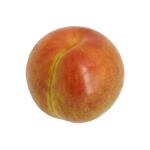Hello all and Happy Saturday! We are very excited for next week’s bins! We are especially excited for our stone fruit: pluots and apricots!
 The pluot is one of my favorite fruits. It has a sweet and unique flavor, plus a cool story.
The pluot is one of my favorite fruits. It has a sweet and unique flavor, plus a cool story.
(From wisegeek.com) The strangely named pluot is a hybrid of the plum and the apricot. The actual ratio works out at about 70% plum and 30% apricot. The pluot is extremely sweet; this is because it has a very high sugar level. Although pluots are a cross breed they mainly look like plums.
Pluots are sometimes sold by the name of Dinosaur egg due to the strange dappled coloring on some types of the fruit.
Many people are suspicious of pluots thinking that this strange fruit must be genetically engineered, but this is not the case. Pluots were first sold in 1989 and were developed by a Californian fruit breeder called Floyd Zaiger. It took Zaiger several generations of cross breeding before the pluot we know today finally emerged.
The process involved in the hybridization is very complex. The climate control must be exactly correct. The process is so precise that pollen is transferred with a tiny brush. Pluots are now registered as Zaiger’s Genetics. There are now at least 25 different varieties of pluot available in stores.
Health Benefits (from Yahoo!)
- Pluots are very rich in vitamin A and also a great source of vitamin C and fiber and is a good source of potassium, and exhibits much more health benefits than its parents.
- Plouts have phytonutrients called neochlorogenic and chlorogenic acid. These function as anti-oxidants that help in removing the free radicals in our body which destroy proteins.
- Consumption of Plouts helps in better absorption of iron in the body, thus helping in better blood circulation in the body, which further leads to the growth of healthy tissues.
- Regular consumption of Plouts will prevent ocular degeneration and any other problem of the eye in the long run. Your eyes will be healthy and strong for long time and you can also retain a sharp eye-sight even at old age.
- Latest research into this wonderful fruit has confirmed that Plouts have anti-cancer agents that will help prevent the growth of cancerous cells and tumors in the body.
We’re also very excited for one of the pluot’s parents, the apricot! A summer staple, apricots are delicious in salads, desserts, drinks, or on their own! They are the perfect snack on a hot summer day. They, too, have an awesome history!
apricots are delicious in salads, desserts, drinks, or on their own! They are the perfect snack on a hot summer day. They, too, have an awesome history!
(From apricot-oil.com) Apricots grew as a wild fruit for thousands of years in China, where they were first cultivated, probably more then 4000 years ago. First character in Chinese alphabet dedicated to apricot dates somewhere before 2000 BC. It was believed that apricot has good influence on fertility at women.
The real center of diversity of the apricot is northeastern China near the Russian border (in the Great Wall area) and not Armenia as the name suggests (Prunus Armeniaca).
With the strong sensory appeal of apricots’ delicate, velvety skin and intensely sweet fragrance and flavor, apricot fruits traveled across the Persian Empire to the Mediterranean where they flourished. First apricots were brought to Middle East by Chinese silk traders and later introduced to Southern Europe by Alexander the Great – in the 4th century BC.
Romans began cultivating apricots about 100 BC (Pliny). Ancient Greeks called them “the golden eggs of the sun”. By the 16th century, apricots were successfully cultivated throughout the Northern Europe. King Henry VIII’s gardener brought the apricot to England from Italy in 1542. The biggest growing brakethrough was achieved by Lord Anson at Moor Park in Hertfordshire, producing the European favourite variety called Moor Park.
The Spanish also took their part in spreading this heavenly fruit – they brought the apricot to the New World, first planting it in Mexico, and later, in their California missions. California is today leading State in the USA regarding the produce of apricots.
Health Benefits
- Apricots are excellent sources of vitamin-A and carotenes. 100 g fresh fruits have 1926 IU or 64% of daily-required levels of vitamin A. Both of these compounds are known to have antioxidant properties and are essential for vision. Vitamin-A is also required for maintaining healthy mucus membranes and skin. Consumption of natural fruits rich in carotenes helps protect body from lung and oral cavity cancers.
- Fresh fruits contain vitamin-C, another natural anti-oxidant. Vitamin-C helps body develop resistance against infectious agents and scavenge harmful oxygen free radicals.
- They are also good source of minerals such as potassium, iron, zinc, calcium and manganese. Potassium is a heart-healthy mineral; an important component of cell and body fluids that help regulate heart rate and blood pressure.
- The total anti-oxidant or ORAC value of raw apricots is 1115 umol TE/100 g. Much of this in these fruits comes from some important health promoting flavonoid poly phenolic anti-oxidants such aslutein, zeaxanthin and beta cryptoxanthins. Altogether these compounds act as protective scavengers against oxygen-derived free radicals and reactive oxygen species (ROS) that play a role in aging, cancers and various disease process.
- Zeaxanthin, a carotenoid selectively absorbed into the retinal “macula lutea” in the eyes where it is thought to provide anti-oxidant and protective light-filtering functions. Thus, consumption of fruits like apricots rich in zeaxanthin helps eyes protect from age-related macular disease (AMRD), especially in the elderly people.




